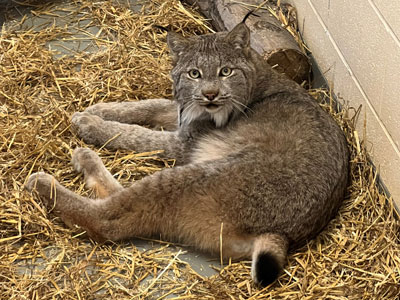October 16th, 2024

Spanish Language Version (PDF)
A five-year-old Canada lynx, named Albert, arrived at Seneca Park Zoo on October 9th. This male lynx is a transfer from Woodland Park Zoo based on a recommendation from the Association of Zoos & Aquariums (AZA); Albert will join current Zoo resident lynx Bianca to form a new breeding pair at Seneca Park Zoo.
“Once again, the AZA is recognizing the quality of care at the Seneca Park Zoo,” said County Executive Bello. “The Seneca Park Zoo is committed to preserving species that are endangered or pressured in challenged habitats. A new breeding pair of Canada Lynx helps that mission.”
“Albert will be quarantining for at least two weeks before being introduced to Bianca,” said Zoo Veterinarian Dr. Chris McKinney, who noted that quarantining animals new to the Zoo in the Animal Hospital is an important component of introduction to help protect animal health. McKinney continues, “Once at Seneca Park Zoo, Albert will stay in a quarantine area so that he may be monitored for any signs of illness before introduction to Bianca. Quarantine areas are custom designed to suit the needs of a particular animal with indoor and outdoor areas, enrichment, and anything else they might need to get acclimated to our Zoo where there are new smells, sounds, and people.”
David Hamilton, the Zoo’s General Curator, said that once Albert clears quarantine, animal care staff will begin working to introduce the two lynx to one another, a careful process which can take time. “Albert will first be introduced to Bianca through mesh without direct contact,” said Hamilton. “They will share the habitat at different times so that Albert can explore the new space and allow both animals to smell each other’s scents.” The lynx will then be introduced with Animal Health and Animal Care teams watching closely.
Albert’s move to Seneca Park Zoo fulfills a Canada Lynx Species Survival Plan Breeding recommendation. These recommendations enable AZA-accredited institutions to manage a genetically diverse, demographically varied, and biologically sound population of any given species.
Canada lynx are best known for their triangle-shaped ears with black tufts and their seemingly oversized paws and can be found in nature throughout Alaska and Canada. While Canada lynx are not classified as Endangered by the IUCN (International Union for Conservation of Nature), they are protected in the southern half of their range due to threats including habitat loss.
We invite the public to come see Albert on habitat the first week in November. For more information and for tickets visit: senecaparkzoo.org.
***
Internationally, and in our own backyard, Seneca Park Zoo plays a key role in species survival. Chartered as an educational institution in 1957 by New York State, the Seneca Park Zoo Society plays an integral role in supporting Monroe County, the owners and operators of the Zoo. Together, we are working to bring animals back from the brink of extinction.













